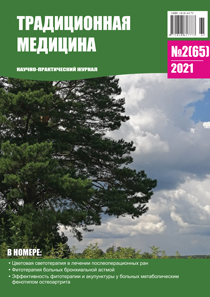Study of dynamics of accumulation of water-soluble polysaccharides in rhizomes and roots of high elecampane during vegetation
DOI:
https://doi.org/10.54296/18186173_2021_2_29Keywords:
water-soluble polysaccharides, inulin, rhizomes and roots of the high elecampaneAbstract
Currently, in medical and pharmaceutical practice, aqueous extracts from the rhizomes and roots of the high elecampane are used, the pharmacological effect being due to water-soluble compounds based on water-soluble polysaccharides. The State Pharmacopoeia of the Russian Federation suggests harvesting of rhizomes and roots of high elecampane during autumn, without specifying a specific period. The purpose of the study is to study the dynamics of the accumulation of water-soluble polysaccharides in the rhizomes and roots of the high elecampane. The preparation of medicinal vegetal raw materials was carried out in an environmentally friendly place in a natural thicket, away from large cities, transport highways and industrial enterprises, monthly, from May to November 2020 (in the middle of the month) in the Novousmansky district of the Voronezh region. The sum of the water-soluble polysaccharides in the selected rhizome and root samples of the high elecampane was determined by a previously developed, validated and patented express gravimetric procedure using ultrasonic extraction. Each determination was carried out three times. It was revealed that the maximum accumulation of this group of biologically active substances in the studied medicinal plant raw materials occurs in October and reaches 30.29 ± 0.46%, which is about 1.5 times more than the content of water-soluble polysaccharides in the rhizomes and roots of the high elecampane in May (21.75 ± 0.38%) and September (22.81 ± 0.39%). The lowest content of the sum of water-soluble polysaccharides in the rhizomes and roots of the high elecampane is noted during its active flowering and the beginning of fruiting in July (11.15 ± 0.40%), which is explained by the significant energy exchange in the plant body during this period, and as a result, consumption of spare nutrients.
References
Яницкая, А.В. Девясил высокий – перспективный источник новых лекарственных средств / А.В. Яницкая, И.Ю. Митрофанова // Вестник Волгоградского государственного медицинского университета. – 2012. – №3(43). – С.24–27.
Захаренко, В.Г. Девясил высокий – лекарственное и декоративное растение / В.Г. Захаренко // Бюллетень Государственного Никитского ботанического сада. – 2006. – №93. – С.17–20.
Konishi, T. Antiproliferative sesquiterpene lactones from the roots of Inula helenium / T. Konishi, Y. Shimada // Biol. Pharm. Bull. – 2010. – Vol.25, №10. – P.1370–1371.
Куркин, В.А. Фармакогнозия / В.А. Куркин. – Самара: СамГМУ, 2004. – С.414–417.
Государственная фармакопея Российской Федерации. Издание XIV. Том 4. – М.: ФЭМБ, 2018. –С.6012–6019.
Патент 2712094 (РФ). Способ получения очищенного инулина из растительного сырья / Н.А. Дьякова, А.А. Мындра, А.И. Сливкин. – 2020. Бюл. №3. – 7 с.
Development and validation of an express technique for isolation and quantitative determination of water-soluble polysaccharides from roots of Taraxacum officinale Wigg / N.A. Dyakova, A.I. Slivkin, S.P. Gaponov [et al.] // Pharmaceutical Chemistry Journal. – 2018. – Vol. 52. No 4. – рр. 343–346.
Development and validation of an express method for assay of water-soluble polysaccharides in common burdock (Arctium lappa L.) roots / N.A. Dyakova, A.I. Slivkin, S.P. Gaponov [et al.] // Pharmaceutical Chemistry Journal. – 2015. – Vol.49. No 9. – pp.620–623.
Статистический анализ медицинских данных. Применение пакета прикладных программ STATISTICA / О.Ю. Реброва. – М.: МедиаСфера. – 2000. – 312 с.
Downloads
Published
How to Cite
Issue
Section
License
Reproduction of any materials without the written permission of the publisher is prohibited.
The responsibility for the accuracy of the information contained in articles and advertisements are the authors and advertisers.






